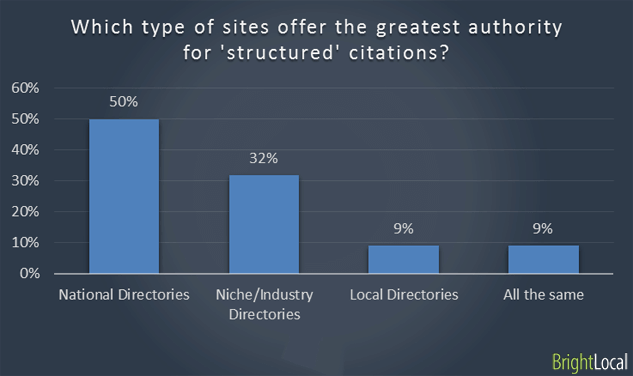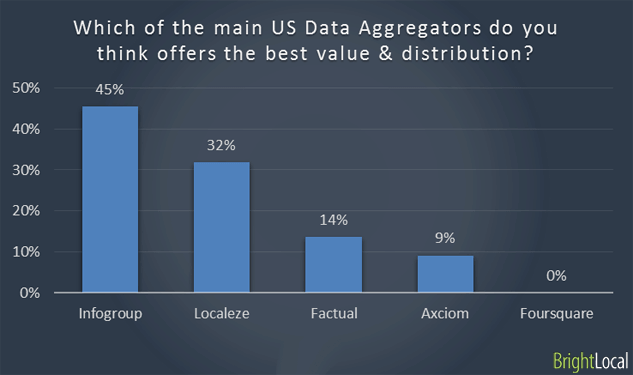Local Experts Say “Relevance” Of Citations More Important Than “Authority”
Columnist Myles Anderson shares findings and insights from BrightLocal's 2015 Expert Citation Survey.

In February and March, BrightLocal conducted its 2015 Expert Citation Survey (which is an update on the same survey we ran in 2013).
We invited 25 knowledgeable and experienced local search marketers to participate, and 22 completed the survey. A huge thanks to them for sharing the time and expertise.
Below are the some of the findings of the survey. The full findings can be viewed online on BrightLocal.
Are Citations More Or Less Important Now Than 12 Months Ago?
Analysis:
The Pigeon update shifted the power in Google’s local algorithm from pure local towards organic factors. Six months since that update, the results of this survey show that citations are still important; however, their “growth in importance” has dropped since the 2013 survey.
In 2013, only 6% of local experts said that citations had become less important in the last 12 months. This figure tripled to 18% in 2015. While only 23% fewer search experts believed that citation importance had actually increased vs. 44% in 2013.
What Is More Important, Quantity Or Quality Of Citations?
Analysis:
As it was in 2013, it Quality of citations trumped Quantity — 70% of experts said that Quality was most important, with only 10% believing Quantity was more important.
The definition of “quality” here is the “authority and relevance of a citation site,” with greater authority and relevance equalling higher quality.
When building citations in the wild, combining quality with quantity delivers the best results for local ranking. Having just 1 high quality, high authority citation doesn’t provide as much citation value as having 30 citations with mixed authority levels.
There is no hard and fast rule for how many citations a business should have. But it’s considered best practice to focus on securing accurate citations on higher authority and relevant sites first and then working down the chain.
When is enough enough? Well, that depends on a host of other factors; but, monitoring local ranking performance post-citation work and benchmarking yourself against your competitors will give you a solid steer on how many you need.
Which Factors Are Most Important When Selecting Which Citation Sites To Use?
Analysis:
There are three stand-out factors to use when judging the value of a citation:
- Industry Relevance
- Local Relevance
- Domain Authority
Industry Relevance is seen as the most important factor, greater than Domain Authority which is often the default criteria used by many. Industry-specific sites are strong citation options for 3 reasons –
- They give search engines a clear indication of the type of business and services you offer
- They tend to have medium-to-high authority by virtue of being a specialist site
- They often rank highly in organic results for specific terms and are a better source of targeted leads to a business
The quality of Local or Regional directories is typically less than Industry specific directories. They suffer from their lack of specialism — e.g., less focused content, less targeted traffic, less ad revenue. While their overall authority is lower they do provide 1 great benefit, and that’s giving a clear ‘local’ signal to google.
Again, it’s clear that a good citation strategy is all about balance. Balancing quality with quantity, and relevancy with authority
Which Type Of Sites Offer The Greatest Authority For Structured* Citations?
Analysis:
- Note: A structured citation (as opposed to ‘un-structured’) is a when site displays business listings using a consistent format, and often make use of structured mark-up (e.g., schema.org) so search and social services can crawl the information without ambiguity.
When looking purely at ‘Authority’ of citations, the clear winner is National Directories. These are characterized by large scale sites with decent (well, reasonable) traffic volume, well structured taxonomy of locations and categories, and a busieness model that affords investment in technology and marketing.
Industry directories come next (see my previous comments on chart above) followed by Local directories.
Not a single local expert selected Event Sites, even though some event sites have very high domain authority and huge traffic volume. I put this down to a lack of relevance; their content is event related, not business related so many businesses can’t justify a listing on an event site. Of course, if your business is a location where events happen then they are very relevant citations, indeed.
Which Of The Main U.S. Data Aggregators Do You Think Offers The Best Value & Distribution
Analysis:
InfoGroup comes out on top as the most valuable aggregator with 45% of the vote. Neustar Localeze comes 2nd with 35% while Factual and Axciom trail behind on just 10%.
Of these four, only Neustar Localeze charges for adding/claiming a listing in their database. Yet despite this cost they still come out 2nd in the value stakes due to their wide distribution of data.
Factual is the newest of the aggregators and is rapidly building up it’s distribution network. It’s also free to submit and doesn’t have a painful set of verification steps to jump through unlike Axciom.
Foursquare is undergoing a transformation, taking it from a socially-driven local marketing platform into a local data provider. It will be interesting to see in 12 months if it has made any inroads into the aggregator market — we’ll loop back in 2016 and run the survey again to find out.
Contributing authors are invited to create content for Search Engine Land and are chosen for their expertise and contribution to the search community. Our contributors work under the oversight of the editorial staff and contributions are checked for quality and relevance to our readers. The opinions they express are their own.
Related stories
New on Search Engine Land




